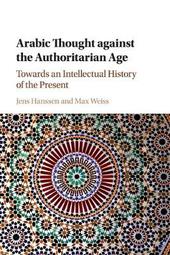
|
Arabic Thought against the Authoritarian Age: Towards an Intellectual History of the Present
Paperback / softback
Main Details
| Title |
Arabic Thought against the Authoritarian Age: Towards an Intellectual History of the Present
|
| Authors and Contributors |
Edited by Jens Hanssen
|
|
Edited by Max Weiss
|
| Physical Properties |
| Format:Paperback / softback | | Pages:455 | | Dimensions(mm): Height 230,Width 153 |
|
| ISBN/Barcode |
9781316644195
|
| Classifications | Dewey:001.0956 |
|---|
| Audience | | Postgraduate, Research & Scholarly | |
|---|
| Illustrations |
Worked examples or Exercises
|
|
Publishing Details |
| Publisher |
Cambridge University Press
|
| Imprint |
Cambridge University Press
|
| Publication Date |
22 August 2019 |
| Publication Country |
United Kingdom
|
Description
In the wake of the Arab uprisings, the Middle East descended into a frenzy of political turmoil and unprecedented human tragedy which reinforced regrettable stereotypes about the moribund state of Arab intellectual and cultural life. This volume sheds important light on diverse facets of the post-war Arab world and its vibrant intellectual, literary and political history. Cutting-edge research is presented on such wide-ranging topics as poetry, intellectual history, political philosophy, and religious reform and cultural resilience all across the length and breadth of the Arab world, from Morocco to the Gulf States. This is an important statement of new directions in Middle East studies that challenges conventional thinking and has added relevance to the study of global intellectual history more broadly.
Author Biography
Jens Hanssen is Associate Professor of Arab Civilization, Middle Eastern and Mediterranean history at the University of Toronto and has held visiting professorships at the universities of Marburg and Goettingen. His book publications include Fin de Siecle Beirut (2005), and his translation of Nafir Suriyya (with Hicham Safieddine) is forthcoming. He is currently co-editing The Oxford Handbook of Contemporary Middle Eastern and North African History with Amal Ghazal. His present Social Sciences and Humanities Research Council (SSHRC) research project, which focuses on the intersections between German, Jewish and Arab intellectual histories, has yielded two articles, 'Kafka and Arabs' (Critical Inquiry, 2012), and 'Translating Revolution: Hannah Arendt and Arab Political Culture'. Max Weiss is Associate Professor of History and Near Eastern Studies at Princeton University, New Jersey. He is the author of In the Shadow of Sectarianism: Law, Shi`ism, and the Making of Modern Lebanon (2010), co-editor (with Jens Hanssen) of Arabic Thought beyond the Liberal Age: Towards an Intellectual History of the Nahda (Cambridge, 2016), and translator, most recently, of Nihad Sirees, States of Passion (2018). He earned a Ph.D. in Modern Middle East History from Stanford University, held postdoctoral fellowships at Princeton University and the Harvard Society of Fellows, and his research has been supported by the Fulbright-Hays Commission, the Social Science Research Council, and the Carnegie Corporation. Currently, he is writing about the intellectual and cultural history of modern Syria, and translating several works of modern and contemporary Arabic literature.
Reviews'A much needed addition to our understanding of the Arab uprisings, their causes, and their meaning. While the political, social, economic, and cultural dimensions of the uprisings have been well explored, this book is unique inasmuch as it probes the overlooked role played by intellectuals in interpreting the Arab condition and articulating the complaints and demands of activists.' James L. Gelvin, University of California, Los Angeles, and author of The New Middle East: What Everyone Needs to Know. 'Spanning a wide range of thinkers, writers and struggles across the Arab world and from the 1940s to the present, this collection of essays by a stellar cast of scholars illustrates both the diversity and the continuities of postwar Arab intellectual history. Whether tracing the complex legacies of the nahda or the travails of the Arab left, Hanssen and Weiss's follow-up to their Arabic Thought beyond the Liberal Age scuttles popular fallacies about the sterility or atavism of Arab intellectual life, illuminates the deeper roots of the 2011-12 Arab uprisings, and makes available to English-language readers important voices that are too rarely heard outside the Middle East.' James McDougall, University of Oxford
|